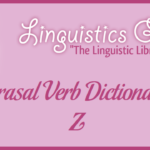Traditional grammars define verbs as “words that denote actions and states of being.” A verb phrase consists of a verb plus any auxiliary verbs, particles, modifiers, complements, and objects.
In grammar, a noun phrase modifier is a word, phrase, or clause that modifies or describes a noun, pronoun, or noun phrase. Verb phrases in the form of present participles, past participles (regular and irregular), and infinitives often function as noun phrase modifiers to describe nouns and pronouns in English. Examples of verbs and verb phrases as noun phrase modifiers include the following:
- I know the gentleman reading. (present participle)
- A man swearing loudly crashed into the crying child. (present participle, present participle)
- The woman singing the song owes me money. (present participle)
- The stolen painting turned up in the park. (past participle)
- A book unread lives a tragic existence. (past participle)
- A tree branch broken during the storm knocked the power out. (past participle)
- He is looking for someone to love. (infinitive)
- Mom left the snacks to bring on the table. (infinitive)
- She has nobody to blame but herself. (infinitive)
Note that the difference between past participles functioning as noun phrase modifiers and adjectives derived from verbs is not always clear.
Present Participle as Noun Phrase Modifier
Past Participle as Noun Phrase Modifier
Infinitive as Noun Phrase Modifier
References
Brinton, Laurel J. & Donna M. Brinton. 2010. The linguistic structure of Modern English, 2nd edn. Amsterdam: John Benjamins Publishing Company.
Hopper, Paul J. 1999. A short course in grammar. New York: W. W. Norton & Company.
Huddleston, Rodney. 1984. Introduction to the grammar of English. Cambridge: Cambridge University Press.






